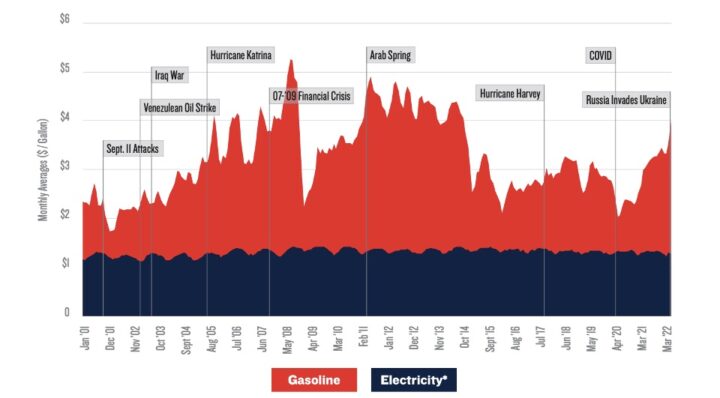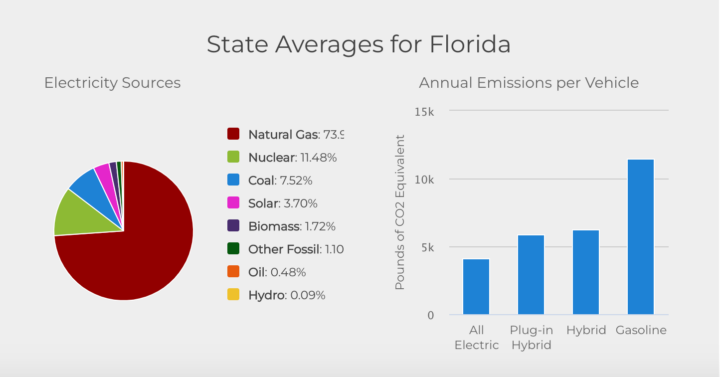Americans should embrace electric vehicles to free ourselves from petrol dictators, enhance national security, reduce fuel costs for consumers, address the climate crisis, and put an end to hazardous offshore drilling. Our transportation systems can run on clean, renewable, domestically-sourced energy, the benefits of doing so are numerous.
Dory Larsen | May 16, 2022 | Clean Transportation, Electric Vehicles, Offshore DrillingWe Can’t Drill Our Way Out
Russia’s invasion of Ukraine has shined a light on how tenuous our reliance on fossil fuels is and the volatility of a product dependent on globalization. Although the oil industry’s position is to call for more drilling, “drill baby drill” is wrong on many levels. Despite record production, fossil fuel costs have skyrocketed for consumers while fossil-fuel companies are raking in record profits.
Domestic drilling does not correspond to having a domestic supply of usable fuel. This is mainly because of two factors:
Crude type
We’re drilling oil we don’t have the infrastructure to refine. Those in the petroleum business categorize crude oil into two main grades based on their weight and “sweetness” or sulfur content. Most of the domestically produced oil is “light and sweet” relative to the oil imported from Russia and the Middle East. Until recently, the US imported far more energy than we produced. The refining infrastructure the industry invested in and built 20-30 years ago was designed to refine the imported heavier and less sweet oil. It will take time and money to retrofit that infrastructure. Time and money better spent transitioning us to renewable-powered electric transportation.
Economics
It’s still cheaper to import heavier, “less sweet” crude from abroad. In 2020, America imported 7.86 million barrels of oil per day, despite producing 19.4 million barrels and consuming 18.12 million barrels per day. So despite the uptick in production, the United States is still heavily reliant on foreign oil.
More drilling means digging a deeper hole and continuing to jeopardize our national and economic security to the whims of volatile and unregulated global oil markets.
Oil Companies Have Substantial Unused Leases
Instead of making investments in infrastructure and despite record net income ($74 billion in Q3 of 2021 alone!) the oil and gas industry gave billions in payouts to shareholders and bought back billions-worth of stock. Additionally, the oil and gas industry has been granted permits to drill on federal lands and is choosing not to drill on those approved sites. The US Senate Committee on Environment and Public Works meeting on March 23, 2022, revealed that the oil and gas industry has 9,000 unused approved permits to drill. Oil companies are sitting on 12 million acres of offshore federally managed leases but are only drilling on a fifth of that acreage. Even more surprising is that although oil production on federal land has increased, over 75% of production occurs on non-federal land. There is no need for the federal government to open up more land when the vast majority of opportunities lie on non-federal lands.
The Solution: Electric Vehicles Powered by American Made Clean Energy
We cannot continue to rely on fossil fuels. In the end, energy security is not going to be achieved by drilling more, but rather by a decisive pivot to electric transportation fueled by clean energy.
In 2018, SACE analyzed how many electric vehicles (EVs) it would take to deploy on American roads to offset any gasoline that could be produced from opening new, currently-protected offshore areas to drilling for oil. The analysis of the current 2022 data reaffirms that if 32 million Americans replace their gas-powered vehicle for an EV, by the early 2030s, gasoline demand would decrease enough to offset the amount of gasoline that could be produced from opening the Atlantic, Eastern Gulf of Mexico, and Pacific combined. This is a completely attainable goal based on the current status, and projected growth, of the U.S. electric vehicle industry over the next ten years.
Protecting the American Consumer and Creating Jobs
American consumers are realizing that electric vehicles are a better value proposition as they become more educated. The total cost of ownership is frequently lower for EVs mainly because of the lower fuel and maintenance costs. Fueling an EV is much less expensive. As a regulated commodity, the price of electricity is considerably cheaper and more stable than oil. This striking graphic illustrates that point:

Additionally, analysis from the Zero Emission Transportation Association found in Florida, Georgia, North Carolina, and Tennessee, some EVs are 5–6 times cheaper to drive.
Most southern states (TN, NC, SC, GA, FL) do not financially benefit from oil because there is no production or refineries. So, purchasing “local” electricity instead of out-of-state gasoline keeps transportation dollars circulating in local economies.
By switching to electric transportation in the Southeast, we can spend $42 billion less annually on fuel. Additionally, $5 billion annually would be recirculating through and supporting local economies if we switched to a fully electric transportation system. If all the cars, trucks, and buses were electric today, the Southeast would have an extra $47 billion circulating through the region’s economy annually. Additionally, driving electric means supporting American jobs. 33% of the national EV production occurs in the Southeast and the industry provides 23,569 American workers with jobs building American-made EVs. EVs also means protecting the tourism industry for coastal communities where the local economy is dependent on oil-free beaches. If we have a huge spill of solar energy, we just call it a sunny day.
Stabilizing Our Climate
The transportation sector is now the largest source of greenhouse gas (GHG) pollution in the United States. Electric transportation is part of the solution to reduce GHG emissions and help combat sea-level rise. There is a misconception that the electricity to power EVs generates as many emissions as gasoline-powered vehicles, as you can see in the graph below.

EVs in Florida emit over 60% fewer GHG emissions annually compared to gasoline vehicles and this holds true for lifetime emissions. This is partly because electric vehicles are significantly more energy efficient than internal combustion engine vehicles. The fuel efficiency for most EVs is over 100 MPGe (MPGe stands for miles per gallon equivalent) compared to 25.7 miles per gallon for a gas vehicle. So they use less energy to get from point A to point B. These emissions reductions are improving every year, and the energy we do use can be domestically sourced from clean energy within the decade.
Turning Frustration Into Action
Now that I’ve taken you behind the scenes of the oil industry, when your co-worker or that dad at the little league game says “we should just drill more oil here in the US” hopefully, you can outline several reasons to explain why that is not a viable option. America leaned in on globalization, and that has put us in a position where drilling for fossil fuels leaves us dependent and vulnerable to selling our domestically drilled product to end-users that can refine it or importing crude that we can refine. The only true solution is a swift and urgent transition to clean energy and clean transportation.

On Saturday, May 21, 2021, folks came together in 14 different coastal communities around our region, and 40 nationwide, for Hands Across the Sand events to make a statement by drawing a line in the sand and saying that we need clean energy and electric vehicles, not risky offshore drilling!
In Indian Rocks Beach, Florida, SACE hosted an event which drew around 100 participants. Beachgoers and the crowd heard from a diverse mix of elected officials like Indian Rocks Beach Mayor Cookie Kennedy, Madeira Beach Mayor John Hendricks, City Council Member Kathleen Beckman, and advocates from SACE, Oceana, Sierra Club, Florida PIRG, and the Florida Conservation Voters.
The oil industry is taking advantage of the pain families are feeling at the pump by pressing elected officials to reverse our protections and expand risky offshore drilling. To protect our coasts from the impacts of offshore drilling and accelerate the transition to clean energy and electric transportation, SACE has sponsored Hands Across the Sand for over a decade, and we continue to support and drive attendance to events around the region.
Offshore drilling is risky to our environment and coastal tourism economy. Please consider supporting SACE’s work to defend our region’s precious coastline from offshore drilling by making a donation to our Annual Campaign today!
Electrify the South is a Southern Alliance for Clean Energy program that leverages research, advocacy, and outreach to promote renewable energy and accelerate the equitable transition to electric transportation throughout the Southeast. Visit ElectrifytheSouth.org to learn more and connect with us.